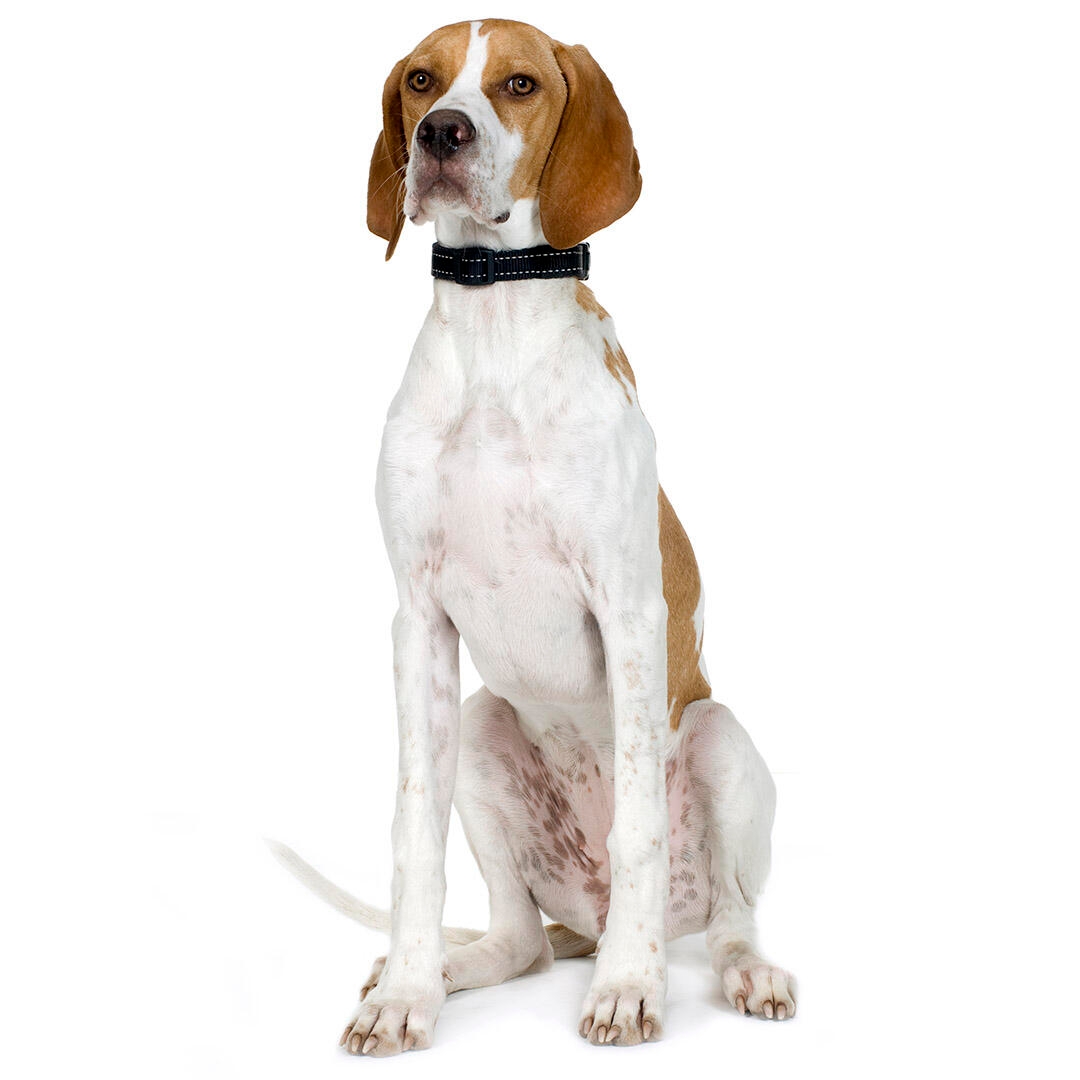
| Family-friendly: | 5/5 |
| Exercise needs: | 5/5 |
| Easy to train: | 5/5 |
| Tolerates being alone: | 1/5 |
| Likes other pets: | 5/5 |
| Energy level: | 5/5 |
| Grooming needs: | 3/5 |
| Shedding: | 3/5 |
The Pointer breed is a relatively hardy breed but can be prone to:
- Hip dysplasia
- Gastric dilatation volvulus
- Hypothyroidism¹ where the thyroid gland is underactive and does not product enough thyroid hormone. This can result in low energy levels, weight gain and skin problems.
Priority Kennel Club health schemes and testing:
None but there are several recommended schemes that the Kennel Club recommends which can be found here.
¹R. F. Nachreiner et al, 'Prevalence of serum thyroid hormone autoantibodies in dogs with clinical signs of hypothyroidism', 2002, Journal of the American Veterinary Medical Association.
As companion dogs, Pointers are friendly and affectionate, and get on well with other dogs and even cats if introduced when young. They are closely bonded to their families and love to be included in everything that is going on. They are sensitive, intelligent and friendly and are welcoming of just about everybody. They are not ideal guard dogs but they will generally bark when someone comes to the door. As long as they are getting the exercise they need, they are quiet dogs in the house.
| Family-friendly: | 5/5 |
| Exercise needs: | 5/5 |
| Easy to train: | 5/5 |
| Tolerates being alone: | 1/5 |
| Likes other pets: | 5/5 |
| Energy level: | 5/5 |
| Grooming needs: | 3/5 |
| Shedding: | 3/5 |
The exact origin of the Pointer dog breed is not entirely clear: whether they originate from Spanish Pointers or from Continental Pointers is uncertain. Other breed historians say that their ancestors have always been English. What is certain however is that the English Pointer, a smaller, quicker dog than the continental Pointers, dates back to the 1600s and was used to 'point' game out to hunters. This is done by finding the game and then halting and indicating its presence rather than flushing it out. These are true canine specialists - and this coupled with their gentle disposition and obedient friendly natures has made sure they have always remained popular.
Ideal Pointer owners are seeking a rather noble, distinguished dog, will have some gundog experience and the ability to work with the Pointer’s natural skills and talents, rather than against them. Patience is required whilst they mature from clownish puppy to serious adult, but if you can supply that, you’ll be rewarded ten-fold by this smart, elegant gundog. You’ll need to put in the hours walking in all weathers, as well as playing games and training, so this dog is best suited to either child free homes, or those with older children who can get involved.
At heart the Pointer is still a working gundog and so needs plenty of exercise every day to include free-running. A fit adult needs two-plus hours of daily exercise but will always be up for more.
This is a country dog who needs a good size home and plenty of countryside to exercise in.
Large breed dogs, as well as having large appetites, benefit from a different balance of nutrients including minerals and vitamins compared to smaller-breed dogs. This breed can be prone to bloating and stomach problems; smaller, more frequent meals can help minimise this risk.
One of the easiest breeds to groom, Pointer dogs only need a brush over during the moulting seasons. However, regular inspection of the coat should be made as skin problems can occur.
The Pointer is an intelligent, biddable dog who will try their best to please their owners but if they are to be the star of the class, they need opportunities to show off what makes them such fabulous gundogs! Pet gundog classes or even scent work classes will be ideal for a Pointer. They should however be taught a reliable recall as outside they can easily be distracted by the thrill of the chase or just the joy of running. Some may only be safe off-lead in enclosed, totally safe areas.
Pointers make excellent family dogs for active outdoorsy families who can give them the exercise they need.
While many dogs are traditionally thought of as being good with children, all dogs and children need to be taught to get on with and respect each other, and be safe together. Even so, dogs and young children should never be left alone together and adults should supervise all interactions between them.